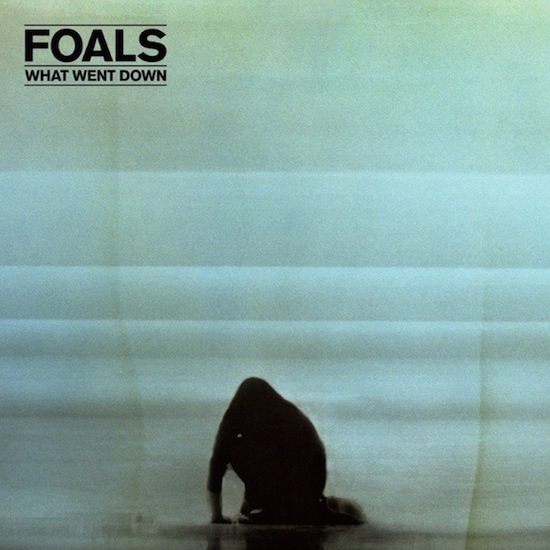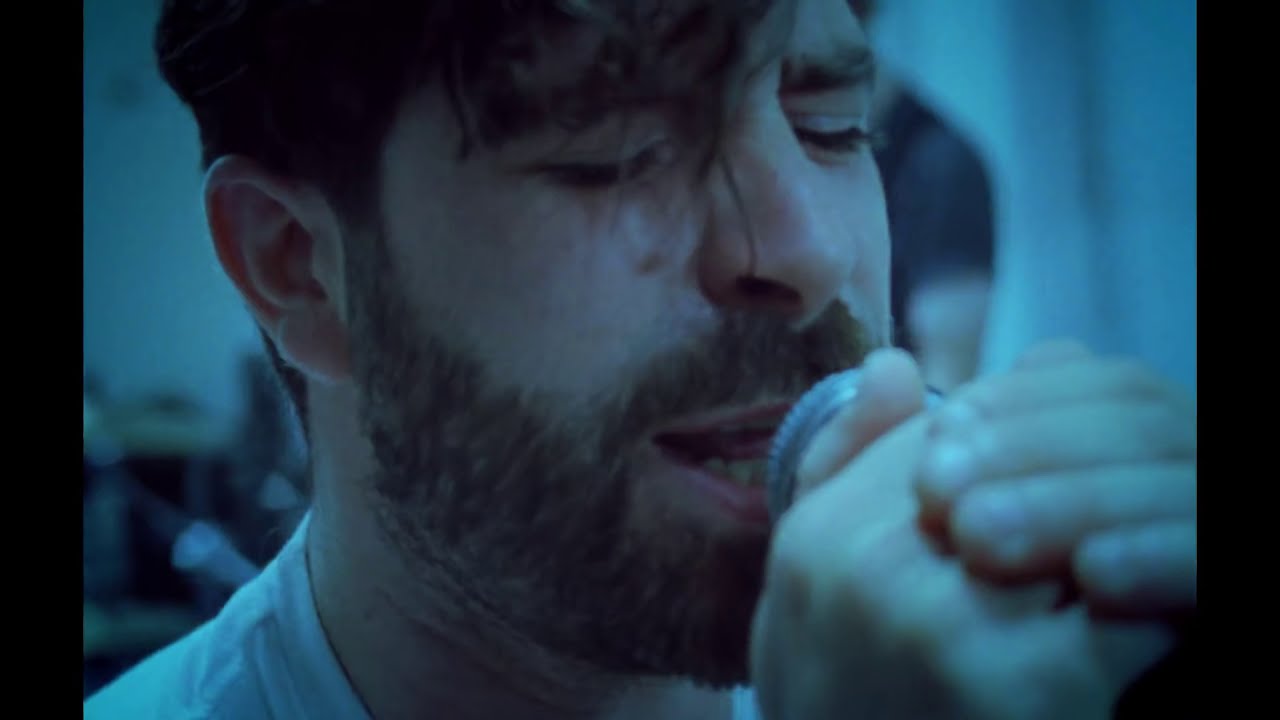There’s a moment in A Death In The Family, the first volume of Karl Ove Knausgaard’s somewhat dubiously-titled series of autobiographical novels, My Struggle, where the Norwegian author is looking over Stockholm, suffering from writer’s block. The humming activity of the city below him gives way to thoughts of how fragile this "regulated and demarcated" world is, and how little it would take to upend the order. "Chaos and unpredictability are essential characteristics of both life and its end, the one impossible without the other, and even though almost all our efforts are directed towards keeping the end at bay, it takes no more than a brief moment of despair before we live in its light and not, as now, its shadow," he writes.
You could say Knausgaard is on a similar level to Yannis Philippakis. The Foals frontman and lyricist delved deep into this kind of end-times thinking for the band’s fourth album, What Went Down. He eschewed what he saw as his natural tendency towards cryptic lyrics in favour of words drawn from the hypnagogic state, noted down on the verge of sleep in an effort to get straight to the subconscious. "That was what was fascinating me this time; the lyrics are personal, but they’re still kind of coded," he said, and it’s a code whose key seems to be the blood-and-guts imagery that’s lingered not far under the surface for so much of the band’s previous work. Guilt gets buried in a pit in the sand, lakes are set ablaze, streets are run, bloody from fist fights; a little portentous, sure: this is a band that called their last album Holy Fire and had a cover of men on horseback standing in roiling, sun-burnished waves; bombast is no stranger. This kind of drama, it turns out, seems to be what’s preying on Philippakis’ subconscious: death, frustration at stasis, thoughts that snag on the past.
It fits, then, that it’s also the band’s biggest sounding record to date. It’s the natural end point of the trajectory the Oxford quintet have been describing since they cast off the math-rock itchiness of their 2008 debut Antidotes in favour of the spacious vistas traversed on 2010’s Total Life Forever. Holy Fire, from 2013, went a step further, wedding this skywards gaze to jackhammer riffs; in short, arena-slaying rock without the naffness, the posturing or the Bono. What Went Down feels like a record whose genesis lies in the moments of calm before the band dealt out the adrenalised chorus of ‘Inhaler’ to the frenzied crowds of big outdoor stages, cast in the sundown afterglow of any number of festival headline slots that came in the wake of the third record. It’s a grand gesture of an album, and one that finds the band relaxing into the space they’ve carved for themselves.
‘Inhaler’ itself, in fact, is the departure point for proceedings here. Just as that track’s title had a certain Ronseal quality to it, its mammoth peaks feeling like a pressurised, life-giving medicating shot, so ‘What Went Down’ too seems to unpack the album’s name, setting the tone for what’s to follow. It’s painted in an elemental, blood-red hue and operates on bold diametrics: it’s indicative of the brazen confidence that fuels Foals now that Philippakis can boil down human flaws into a chorus line as simple as, "When I see a man, I see a lion/ When I see a man, I see a liar".
Jumping off the crooked organ chord that opens the track, it’s a heavy, violent pulveriser, one that realises and promptly unleashes the power of three monumental chords. It’s also the distillation of all this subconscious-combing Philippakis has set about. "The mindset was that we didn’t want to make an overly cerebral record," he’s commented, and the title track, a one-take recording, is just that, something that takes ‘Inhaler”s trick of borrowing common phrases – "you’re the apple of my eye" – and dealing in simplistic, militant opposition: "’Cause while you were sleeping, I took over your town". In short, pure vitriolic torrent.
If ‘What Went Down’ is all bloodlust, the second song, ‘Mountain At My Gates’, is the mediating voice of reflection. Its doom-laden metaphors site Philippakis watching the destruction of Sodom and Gomorrah, gazing on "fire lake and far flame", obstacles that are overcome by the closing upsurge, an empowered acceptance of the state of things: "Gimme my fate/ Gimme my lungs/ Gimme my voice/ You keep me coming around". Backing this is Foals’ seemingly unique ability to forge something that’s as anthemic as it is filled with grace: Jimmy Smith’s cycling chords are muscular without being overbearing, while Philippakis picks out vaulting arpeggios above; skip ahead and this gets wed to their love of circle-pit hardcore levels of aggression, Jack Bevan almost pummelling out a blast beat for the coda.
It may seem restrictive to say that the band pivot on two modes of operation, but it’s not meant to; Foals seem to know that they work best when dealing out kinetic powerhouses or hefty slow-burners, and the rest of the album navigates between these. ‘Birch Tree’ and ‘Night Swimmers’ pick up on the sparseness and intricacy that they retained from their debut on Total Life Forever, a palimpsest of the nervy urgency that ran through ‘Hummer’ and their Skins house party antics. Now it’s been repurposed, becoming the vehicle for Philippakis to meditate on aging and time’s ceaseless elapse on ‘Birch Tree’, casting around thoughts of hometowns long since left and friendships fallen away, with the sonics too expanding, their initial blueprint of "techno, Steve Reich and Afrobeat" added to by funky, Prince-like guitar flexings. At the other of the spectrum are ‘Give It All’ and ‘London Thunder’, songs that fall in the mould of ‘Spanish Sahara’, the heart of Total Life Forever that remains the centrepiece of their live set, which build from synth swells or dirt-flecked Rhodes chords to become vast panoramas, casting their gaze over failings past.
At times, it almost feels a little too well done, the ricocheting handclaps on ‘London Thunder’ one production tweak too far. It feels at odds to say so, given the speedy turnaround of What Went Down – written between last September and February and recorded earlier this year in the south of France, ample refreshment on hand from the region’s fine wine – but Holy Fire‘s brilliance partly came from the fact that it fell just short of a too-bright sheen. Equally, there’s some of the frontloading that’s marked previous records – Total Life Forever peaked with ‘Spanish Sahara’ and Holy Fire‘s energy dissipated a little after ‘Late Night’ – and so, too, do the opening four tracks of What Went Down hit an obstacle. ‘Albatross’ leans too heavily on ping-ponging percussion and tom tom rhythms that end up enervating, and it’s followed by ‘Snake Oil’, the slightly less raging relation of the title track, where the sinewy riffs leave the spectre of producer James Ford’s work with the Arctic Monkeys lingering uneasily.
What the album does do, though, is make good on their express intention of capturing the energy that suffuses a Foals gig. On Tuesday night, the band played a launch show at the Village Underground in London. Picking a venue smaller than the higher-capacity spots they could easily sell out was a deliberate choice: Foals come from a background of sweaty squat shows, and their fractiousness is something that remains absolutely undimmed. Tellingly ‘What Went Down’ and ‘Mountain At My Gates’ get received with the same appetite for, well, losing one’s shit to, as ‘Inhaler’, ‘My Number’ and ‘Two Steps, Twice’, and it’s this that pays into the album. Closer ‘A Knife In The Ocean’ initially bespeaks resignation – "Now that we’re older, the future is colder/ But what is there to do?" – but the resilience that answers this question, "The fire is coming, but we’ll outrun it/ We’ll never be undone", is borne aloft by a mammoth swelling of synthetic strings, tumbling guitar lines and martial drums, animated by the unifying force that marks the best moments of live music. To return to Knausgaard, What Went Down is Foals’ album most marked by life’s chaos and unpredictability, but rather than feeling defeated, it dwells on the burning rage and release that comes with acceptance, basking in the light of the end.
<div class="fb-comments" data-href="http://thequietus.com/articles/18656-foals-what-went-down-review” data-width="550">





